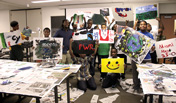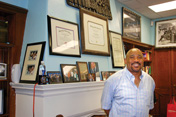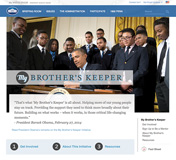My Brother's Keeper: Intergenerational Mentoring for At-Risk Youth
- Austin D. Jackson, Ph.D.
- Assistant Professor, Residential College in the Arts and Humanities
- Director, My Brother's Keeper

Austin Jackson (center) discusses the importance of mentoring with students A.J. Rice (left) and Zack Silverman (right).
 My Brother's Keeper (MBK) is a Residential College in the Arts and Humanities (RCAH) pre-college civic engagement and mentoring program for at-risk African American males in middle school at the Paul Robeson Malcolm X Academy in Detroit. Austin Jackson leads the program, overseeing an MSU collaboration rich in historical context, academic innovations, and societal impacts.
My Brother's Keeper (MBK) is a Residential College in the Arts and Humanities (RCAH) pre-college civic engagement and mentoring program for at-risk African American males in middle school at the Paul Robeson Malcolm X Academy in Detroit. Austin Jackson leads the program, overseeing an MSU collaboration rich in historical context, academic innovations, and societal impacts.
Dr. Jackson knows about at-risk youth dynamics and the importance of mentors. With parents who had fallen victim to the crack cocaine epidemic in Upstate New York during the 1980s, Jackson became self-reliant at an early age. He joined the Navy and served during the Gulf War, stationed on a fast-attack nuclear submarine. "I went to a lot of funerals when I was younger. Too many of my Black male peers were lost to prison, drug addiction, or murder."
To avoid the same fate, Jackson immersed himself in the politically conscious rap music and hip-hop culture of the 1980s: "The lyrics of Public Enemy, KRS-One, and Eric B and Rakim raised my social consciousness in ways my formal education did not." His interest in using rap, hip-hop, and Black popular culture as an educational intervention led him to pursue an M.A. in critical studies in the teaching of English and a Ph.D. in African American and African Studies at Michigan State University.
"...as a potential intervention tool, [Saturday workshop] performances are not only a reflection of who we are; they also shape and direct who and what we can become."
The potential of hip-hop as a teaching tool is reflected in this year's My Brother's Keeper theme, "Detroit Remix: (Re) Invention, Creativity, Performance." The Saturday teaching and mentoring sessions provide a series of creative workshops on creative writing, spoken word poetry, improvisational performance, and more. Jackson says that, as a potential intervention tool, "Performances are not only a reflection of who we are; they also shape and direct who and what we can become. Within MBK, critical perspectives of performance can provide us a window in which to see certain kinds of behavior in the normal, everyday cultural practices of Black youth culture. They can also provide a range of alternative 'scripts'—if necessary—to incorporate into their own, individual performative repertoires."

Young students in a My Brother's Keeper workshop show their art created with Emmanuel Nkuranga (left), a visiting artist from Rwanda.
Jackson credits undergraduate research opportunities sponsored by the Graduate School for connecting him to his sustaining mentor, University Distinguished Professor Emerita Geneva Smitherman. Jackson spent several summers studying under Dr. Smitherman (affectionately known as "Dr. G") at MSU while completing his B.A. in English at Norfolk State University, an HBCU in Norfolk, Virginia.
Smitherman is a dynamic force, and her longtime career as an educator, scholar, and advocate has fostered a generation of scholars who continue her vision with their own professional talents. She was one of the founding committee members of the African American Studies doctoral program at MSU, where Jackson was the second student to earn a Ph.D. from the program in 2009. A year earlier, the first graduate was Jeffrey Robinson, who is now principal of the Paul Robeson Malcolm X Academy and community partner of the RCAH My Brother's Keeper collaboration.
Smitherman established and served as the longtime director of the MBK program. Jackson took over the directorship when Smitherman retired in 2011.
On March 10, 1990, nearly 500 people turned out on a Saturday morning to attend a conference called by an informal group that included Smitherman, with the aim of "Improving Self-Concept for At-Risk Black Students, with Emphasis on Saving the Black Male." As a result of the call to action by that group, the Detroit School Board created a Male Academy Task Force to study issues surrounding education and mentoring and develop a strategic plan.
The Groundwork for My Brother's Keeper
In the late 1980s and early 1990s the education of Black males came to the national forefront, with alarming statistics documented in Educating African American Males: Detroit's Malcolm X Academy Solution (1996):[1]
- 23% (nearly one in four) of Black men ages 20-29 were either in prison, in jail, on probation, or on parole on any given day in 1990 (Mauer, 1990).
- 41% of Black males were unemployed versus 16.5% of White males (U.S. Department of Labor, 1985).
- 40% of adult Black males in Detroit were functionally illiterate in 1988 (Detroit City Council, 1991).
- The Black male high school drop-out rate was estimated to be as high as 60% in select urban areas (Detroit City Council, 1991).
- Black male college enrollment in 1976 was 4.3% and by 1986 had declined to 3.5%. From 1976 to 1986 the proportion of Black men attending college suffered the largest decline of all racial and general groups (American Council on Education, 1988).
- Homicide was the leading cause of death among African American males ages 15-24, and a Black male was twice as likely to die before the age of 45 as a White male (Detroit City Council, 1991).
1 Sources briefly noted here are as cited in Watson, C., & Smitherman, G. (1996). Educating African
American males: Detroit's Malcolm X Academy solution. Chicago, IL: Third World Press. Return to content
My Brother's Keeper was initially implemented in 1990 at Woodward Elementary School in Detroit with the following objectives:
- Eradicate fear of the unknown, specifically college life.
- Start early with middle-school students, because young Black male high school dropout rates are still too high.
- Introduce college life to mentees through the eyes of their mentors, many whom share the same socioeconomic backgrounds.
- Increase mentees' knowledge of, and preparation for, viable career options.
- Increase mentees' sense of educational self-esteem, personal responsibility, self-control, and self-discipline.
Partnering with the Paul Robeson Malcolm X Academy in Detroit

Jeffrey Robinson, principal of Paul Robeson Malcolm X Academy, Detroit.
In 1991, when the late science and math educator Dr. Clifford Watson, along with Smitherman and other members of the Detroit community, established the Malcolm X Academy, it was the first public African-centered elementary school in the United States. The school was initially geared toward males in the pre-K to eighth grades in the Detroit Public Schools. My Brother's Keeper and the collaboration with MSU was instituted at the same time.
When Jackson became the MBK graduate coordinator in 1999, he had already begun mentoring during his own graduate studies. The importance of encouraging Black males to pursue educational goals, as well as the Academy's emphasis on students' historical roots and traditions to give context in developing cultural pride, self-esteem, and community identity, resonated with him.
Robinson spent 18 years as a teacher, and is only the Academy's second principal.
The current program is implemented with the leadership and collaborative efforts of Jackson and Robinson, who is now in his fifth year as principal.
While MBK is an RCAH pre-college program, and Jackson and the MSU team offer their Saturday sessions at the college's facilities, participants get familiar with the entire campus during visits. Mentors also travel to Detroit for field experiences at the Academy, conducting classroom observations and spending time with their mentees during the school day.
Transportation, meals, supplies, fees, and other expenses are made possible by support from RCAH; Vennie Gore, MSU Vice President for Auxiliary Services; MSU Residential and Hospitality Services; MSU Student Housing Cooperative; Alpha Phi Alpha Fraternity, Inc. (MSU undergraduate chapter); private individual donations; and Detroit Public Schools.
Mentors are MSU undergraduate students who are screened and trained to work with the middle schoolers. Traditionally focused on working with boys, the 2014 program includes girls, and activities have been designed to incorporate the co-ed atmosphere.
The Paul Robeson Malcolm X Academy selects students based on their continuing efforts to climb academically. They are recommended by teachers, with parent support. Word of mouth by students already in the program often inspires others to seek entry into MBK. There are approximately 45 sixth to eighth graders participating, with 10 to 15 slots that open up for new inductees each year. Robinson promotes a steady emphasis on educational pursuit and the MBK program.
"Our teachers put their degrees on the wall," said Robinson. "The students that are selected for the My Brother's Keeper program are scholars. Any student can join if they are willing to facilitate their dreams by focusing on school. We want them to know that their hard work has benefits now and in the future."
More than half of the Paul Robeson Malcolm X Academy eighth graders continue their education at one of the three top-performing Detroit high schools that send graduates on to college.
The partnership continues to evolve and is now working to align MBK goals and objectives with the curriculum guidelines at Detroit Public Schools.
"We want to engage in a systematic way, and a measurable way, so that the pedagogical efficacies are defined. Achieving a replicable model can lead to mass success," says Jackson.
The My Brother's Keeper Program is a long-standing university-community partnership with deep academic and professional connections. Jackson and Robinson are seeing a new strength emerge. As mentees mature and pursue higher education, they are joining in the efforts to mentor younger students, resulting in a generational effort to improve outcomes for some of Detroit's most vulnerable, and most promising, citizens.
About President Obama's MY BROTHER'S KEEPER Initiative

In a Presidential Memorandum dated February 27, 2014, President Barack Obama established an interagency effort to improve educational and life outcomes for boys and young men of color. Representatives from the highest levels of the federal government named to a My Brother's Keeper Task Force included the U.S. Attorney General and the secretaries of Agriculture, Commerce, Defense, Education, Health and Human Services, Housing and Urban Development, Interior, Labor, and Transportation.
Among the goals of the Task Force is to address the persistent opportunity gaps faced by boys and young men of color, determine the public and private efforts that are working, and concentrate efforts to expand upon them. President Obama has directed the Task Force to evaluate how the federal government's own policies and programs can better support these efforts, and how to better involve state and local governments, the private sector, and the philanthropic community.
There is no direct connection between the MSU program and the presidential initiative at the federal level, but President Obama is currently addressing similar concerns for boys and young men of color nationwide as those brought to the forefront for Detroit male youth in the late 1980s and early 1990s by Geneva Smitherman and her colleagues.
The Task Force has identified a number of areas where the federal government can lead by example, outlining key areas for further focus, making recommendations, and assessing progress. The work of the initiative is just beginning, and the Obama administration has pledged to address this long-recognized problem in a comprehensive manner.
- Written by Carla Hills, University Outreach and Engagement